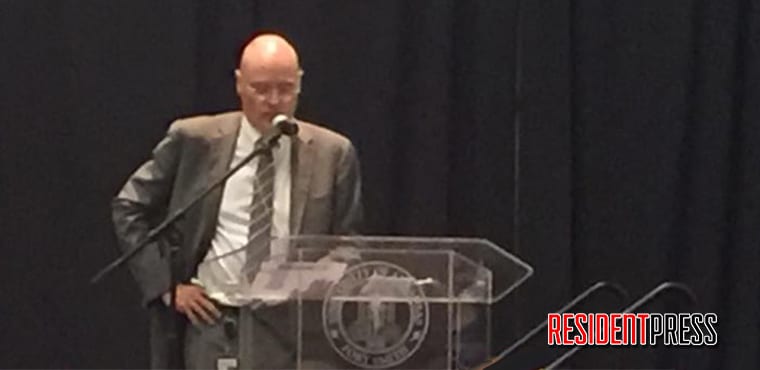Article by Darrell Spells
Representatives from law enforcement, medical professionals, rehabilitation services, and others gathered at the Smith-Pendegraft Campus Center at the University of Arkansas at Fort Smith to address the opioid crisis in Sebastian County. Sheriff Bill Hollenbeck served as emcee of the summit. Law enforcement was represented by members from the Sebastian County Sheriff’s Office, Fort Smith Police Department, Mansfield Police Department, Hackett Police Department, Barling Police Department, Huntington Police Department, as well as first responders throughout the county. Attendees heard from several speakers from various fields detailing how the Opioid crisis is being addressed in Arkansas and Sebastian County.
Arkansas drug czar Kirk Lane provided those in attendance with statistics regarding the dangers of the Opioid problem. Lane described the problems with opioids in a term he called “Opidemic”. According to Lane, Arkansas is second only to Alabama in the number of opioid prescriptions per one hundred people. 2016 statistics show that Sebastian County had 169 prescriptions per one hundred people. Lane addressed the dangers of Fentanyl as well. Fentanyl is thirty to fifty times stronger than heroin. To demonstrate the potency of Fentanyl, he explained a small dosage of Fentanyl (one gram) could kill between 300-500 people. One gram is equivalent to a package of sweet and low.
Arkansas Attorney General Leslie Rutledge also spoke to the crowd and commended the efforts of Sebastian County in coming together to host the summit. Rutledge also noted the success of the Arkansas Prescription Take Back Program which has became a model program for the entire country.
Dr. Cheryl May of the Arkansas Criminal Justice Institute spoke of the efforts being made to provide law enforcement training on the use of Naloxone in response to overdoses. Law Enforcement agencies and first responders throughout Arkansas are being trained on the proper use of Naloxone and many agencies are carrying them in their patrol vehicles. Naloxone is currently available without a prescription to the general public. May also emphasized the importance of the Joshua Ashley-Pauley “Good Samaritan Law”. Many witnessed to overdoses are fearful of calling for help due to the fear of being arrested by law enforcement. The legislation allows provides immunity from arrest, charge and prosecution for people who seek medical assistance for victims of drug overdoses.
The summit also featured breakout sessions for members of healthcare, education, social services, and first responders. Attendees were able to attend sessions that applied to their respective fields and ask questions. Breakout sessions were hosted by Dr. Mancino-UAMS, Dr. Goree UAMS, Kristina Carnes-Attorney General’s Office, Tabitha Fondren and Katie Priest-Harbor House, and Dr Cheryl May-First Responders. The summit closed with a question and answer session featuring panelists Arkansas Representative Justin Boyd, DTF director Paul Smith, Dr. Lee Johnson, Dr. Bryan Clardy, Dr. Don Phillips, Jimmie Wooding of Harbor House, and Sebastian County Prosecuting Attorney Dan Shue.






